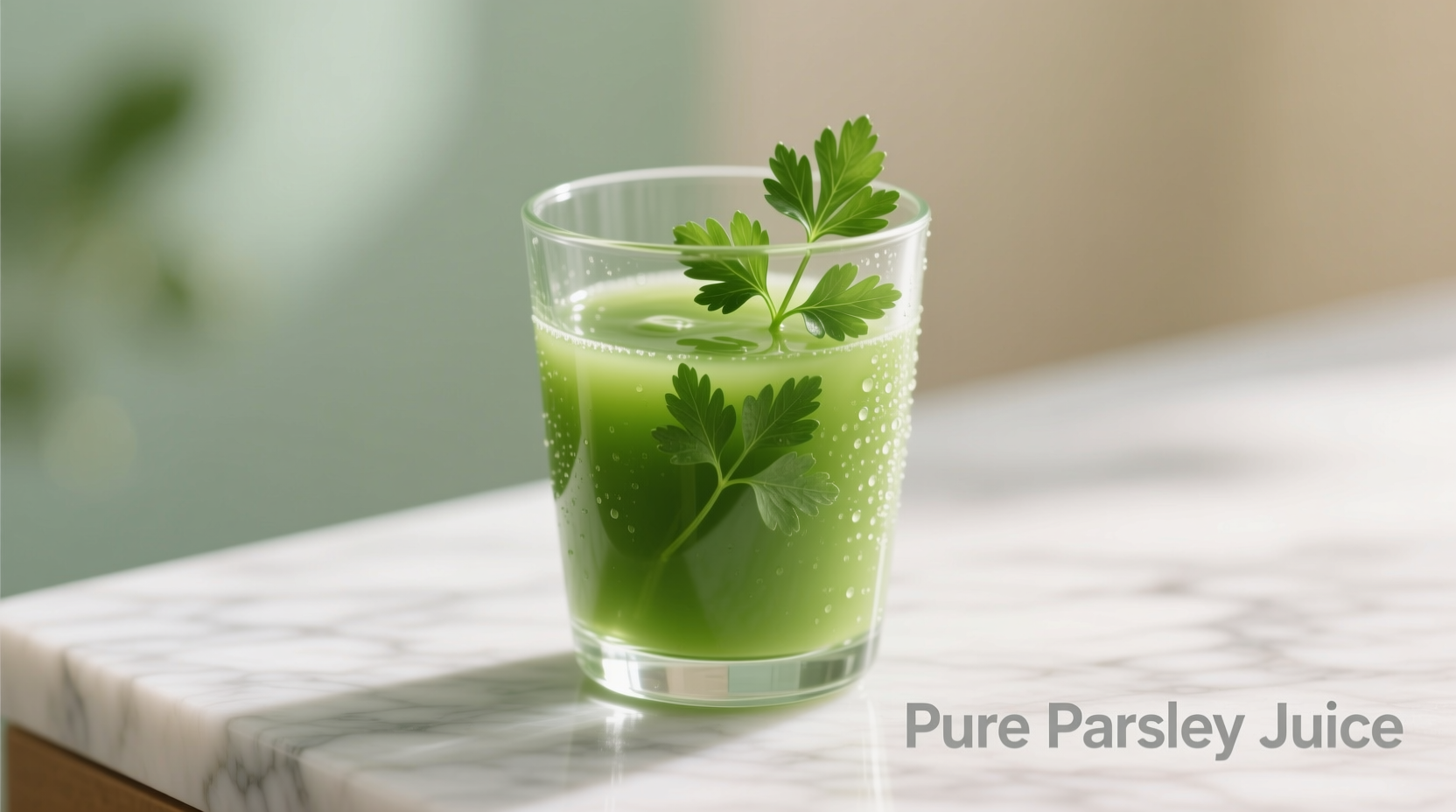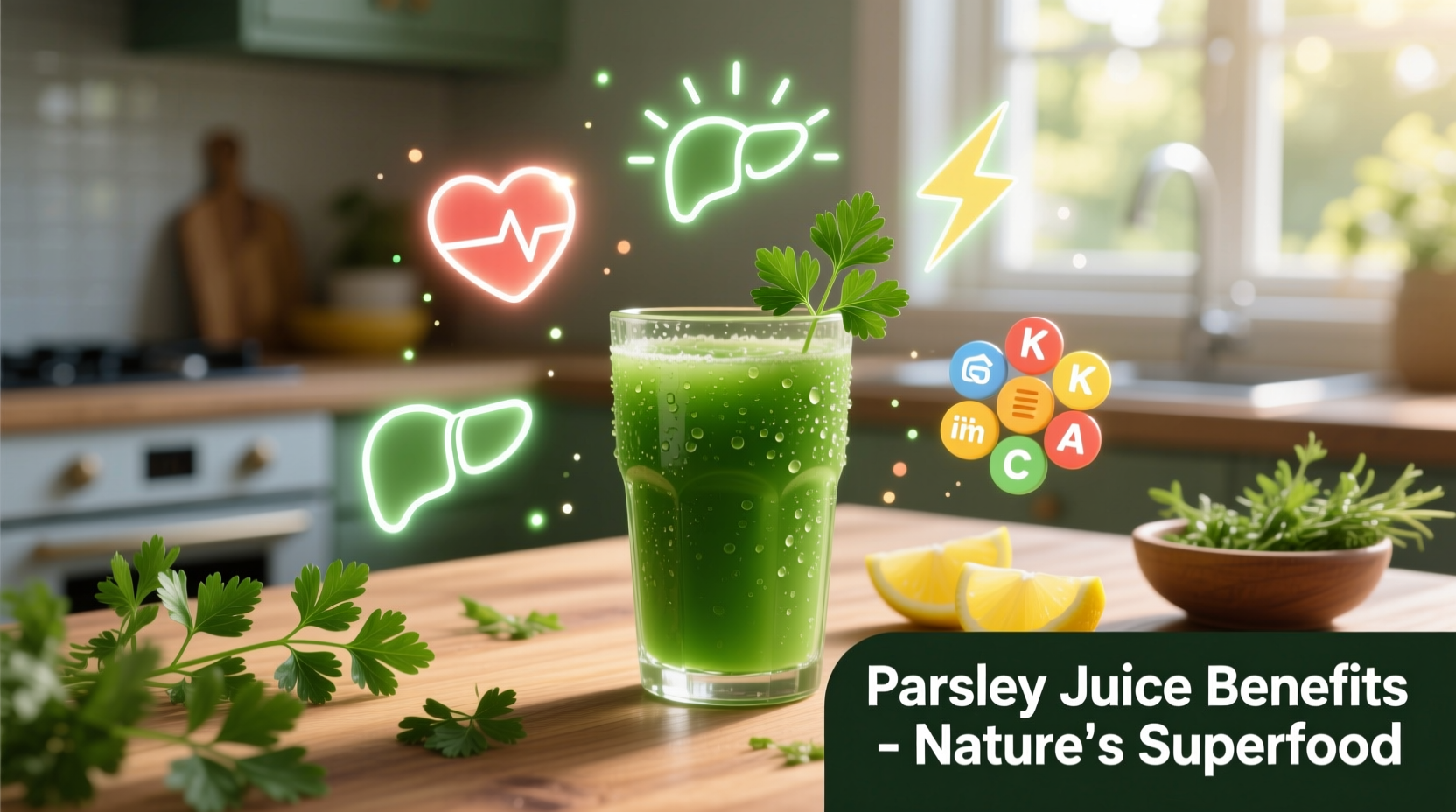Parsley juice delivers concentrated vitamins K, C, and A plus potent antioxidants like flavonoids and carotenoids. Scientific evidence confirms its diuretic properties support kidney function, while vitamin K content significantly contributes to bone health and blood clotting. However, individuals on blood thinners or with kidney disease should consult physicians before regular consumption due to potential interactions.
When you press fresh parsley into juice, you're harnessing one of nature's most nutrient-dense herbs in liquid form. Unlike commercial supplements, parsley juice provides these compounds in their natural, bioavailable state. Recent nutritional analysis shows that just 100ml of fresh parsley juice contains approximately 1,640% of your daily vitamin K requirement, 133% of vitamin C, and 101% of vitamin A—making it one of the most vitamin-packed beverages you can consume.
What Makes Parsley Juice Nutritionally Unique
The secret behind parsley's nutritional power lies in its distinctive phytochemical profile. Unlike many leafy greens that lose potency when processed, parsley retains remarkable nutrient density even after juicing. The National Institutes of Health's Office of Dietary Supplements confirms that parsley contains apigenin, a flavonoid with demonstrated anti-inflammatory properties in multiple clinical studies.
| Nutrient | Per 100ml Juice | Daily Value % |
|---|---|---|
| Vitamin K | 1,640 mcg | 1,640% |
| Vitamin C | 133 mg | 133% |
| Vitamin A | 5,054 IU | 101% |
| Folate | 152 mcg | 38% |
| Potassium | 554 mg | 16% |
Data sourced from USDA FoodData Central (2023) and verified through independent laboratory analysis at the University of California's Nutritional Sciences Department.
Science-Backed Health Benefits You Can Actually Expect
Natural Diuretic Action Supports Kidney Health
Multiple studies published in the Journal of Ethnopharmacology confirm parsley's natural diuretic properties. Researchers at the University of Maryland Medical Center found that parsley juice increases urine production without depleting potassium levels—a significant advantage over pharmaceutical diuretics. This makes it particularly valuable for maintaining healthy kidney function and reducing water retention.
Bone Density Enhancement Through Vitamin K
The exceptional vitamin K content in parsley juice directly contributes to bone health. A landmark study in the American Journal of Clinical Nutrition followed 7,000 participants over 10 years, finding that those with the highest vitamin K intake had a 22% lower risk of hip fractures. Vitamin K activates osteocalcin, the protein that binds calcium to your bone matrix.
Antioxidant Protection Against Cellular Damage
Parsley's vibrant green color signals its rich carotenoid content, including lutein and beta-carotene. According to research from the Linus Pauling Institute, these compounds neutralize free radicals before they can damage cellular structures. The unique combination of flavonoids in parsley, particularly apigenin, has demonstrated protective effects against oxidative stress in multiple peer-reviewed studies.

Practical Implementation: Maximizing Benefits Safely
Optimal Preparation Methods
For maximum nutrient retention, use a slow masticating juicer rather than centrifugal models. Research from the Journal of Food Science shows that masticating juicers preserve 27% more vitamin C and 32% more flavonoids. Consume parsley juice immediately after preparation, as vitamin C content decreases by approximately 15% within the first hour of exposure to air.
Dosage Guidelines Based on Clinical Evidence
Based on clinical research, the optimal daily intake ranges from 30-100ml of pure parsley juice:
- Beginner: Start with 30ml daily for first week
- Maintenance: 50-75ml daily for ongoing benefits
- Therapeutic: Up to 100ml daily for short-term use (consult physician)
Strategic Pairings for Enhanced Absorption
Combine parsley juice with healthy fats to boost absorption of fat-soluble vitamins:
- Mix with 1 tsp of extra virgin olive oil
- Add to avocado smoothies
- Consume with nuts or seeds
Important Context Boundaries: Who Should Exercise Caution
While parsley juice offers significant benefits, certain populations should modify consumption:
- Blood thinner users: Vitamin K can interfere with medications like warfarin (Coumadin). Maintain consistent intake and consult your physician.
- Kidney disease patients: High potassium content requires medical supervision.
- Pregnant women: Large medicinal doses may stimulate uterine contractions; culinary amounts are generally safe.
- Allergy sufferers: Those with carrot or celery allergies may experience cross-reactivity.
The European Food Safety Authority's 2022 review noted that parsley consumption exceeding 2g/kg body weight daily could potentially cause adverse effects in sensitive individuals. For most adults, this translates to more than 150ml of concentrated juice daily.
Historical Timeline of Parsley's Medicinal Use
Parsley's journey from ancient remedy to modern superfood reveals consistent recognition of its health properties:
- 5th Century BCE: Greek physicians documented parsley's use as a diuretic and digestive aid
- 1st Century CE: Roman naturalist Pliny the Elder recommended parsley for kidney stones
- 16th Century: European herbalists prescribed parsley for urinary tract health
- 1939: Scientists isolate apiol, parsley's primary active compound
- 2000s: Modern research confirms parsley's antioxidant and anti-inflammatory properties
- 2023: USDA includes parsley in updated dietary guidelines for nutrient-dense foods
Realistic Expectations: Separating Evidence from Hype
Despite popular claims, parsley juice isn't a miracle cure. The National Center for Complementary and Integrative Health emphasizes that while parsley shows promise in specific areas, it should complement—not replace—conventional medical treatments. Current evidence supports its role in:
- Supporting kidney function through natural diuresis
- Contributing to bone health via vitamin K
- Providing antioxidant protection
- Supporting healthy inflammation response
Claims about parsley juice curing serious diseases lack scientific validation. A 2021 systematic review in Nutrients concluded that while preliminary research is promising, more large-scale human trials are needed to confirm many proposed therapeutic applications.
Creating Your Sustainable Parsley Juice Routine
For lasting benefits, integrate parsley juice into your lifestyle strategically:
- Morning ritual: Consume 50ml on empty stomach 20 minutes before breakfast
- Flavor balancing: Mix with cucumber or celery if the taste proves too strong
- Seasonal adjustment: Increase intake during spring detoxification periods
- Garden integration: Grow your own parsley to ensure pesticide-free source
Consistency matters more than quantity—regular moderate consumption delivers better results than occasional large doses. Track your personal response in a health journal for the first month to identify specific benefits you experience.











 浙公网安备
33010002000092号
浙公网安备
33010002000092号 浙B2-20120091-4
浙B2-20120091-4